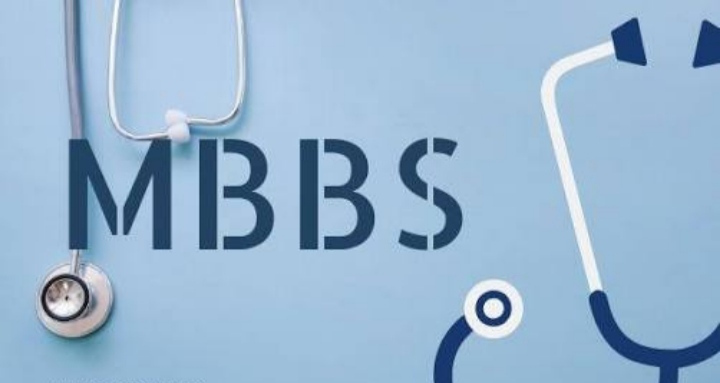MBBS, an abbreviation for “Bachelor of Medicine, Bachelor of Surgery,” is a graduate-level program designed for individuals with aspirations to become medical doctors. These programs generally span a duration of five to six years, contingent upon the specific state or university requirements.

MBBS Admission Process
The admission process for an MBBS (Bachelor of Medicine, Bachelor of Surgery) program can vary from one country or university to another, but here is a general overview of the typical steps involved in gaining admission:
- Eligibility requirements: Candidates must meet certain eligibility criteria, which typically include completion of high school education in specific courses such as biology, chemistry, and physics Some universities may require having a minimum GPA or standardized test scores such as the SAT or ACT.
- Entrance Examination: Many states and universities require candidates to take a standardized medical examination. These tests assess a candidate’s knowledge of biology, chemistry, physics, sometimes general knowledge, English language skills etc. Thus examples of these tests are the MCAT (Medical College Admission Test) in the US or the NEET (National Eligibility cum Entrance Test) in India
- Application Process: Candidates must apply to the respective universities or colleges in which they wish to apply. Typically, this application includes course notes, standardized test scores, letters of recommendation, and a personal essay or essay explaining their motivations for practising medicine
- Interview: Some universities may require applicants to attend an interview as part of the selection process. During the interview, candidates may be evaluated on their communication skills, motivation, and suitability for the medical profession.
- Selection: After considering all the applications and exam results, universities select the candidates based on their performance. Competition for MBBS programs can be fierce, and not all applicants may be accepted.
- Counselling and Seat Allocation: In some states, there is a centralized counselling system where seats are allotted to medical colleges based on the rank and merit of the successful candidates
- Document verification: Once the candidates are selected, the original documents must be submitted
MBBS Curriculum
| Semester | Subjects |
|---|---|
| 1 | Anatomy, Physiology, Biochemistry, Community Medicine |
| 2 | Pharmacology, Pathology, Microbiology, Forensic Medicine and Toxicology |
| 3 | Internal Medicine, Surgery, Obstetrics and Gynaecology, Paediatrics |
| 4 | Orthopaedics, Ophthalmology, ENT, Dermatology and Venereology |
| 5 | Anesthesiology, Radiology, Psychiatry, Community Medicine (Inwards) |
| 6 | Internship (OPD, IPD, OT, Labour Room, Casualty) |
Top Medical Colleges for MBBS
- All India Institute of Medical Sciences (AIIMS), Delhi
2. PGIMER (Chandigarh) Post Graduate Institute of Medical Education and Research
3. Christian Medical College, Vellore
4. SGPGI – Sanjay Gandhi Postgraduate Institute of Medical Sciences, Lucknow
5. Amrita Vishwa Vidyapeetham, Coimbatore
6. BHU (Varanasi) – Banaras Hindu University, Varanasi
7. Kasturba Medical College, Manipal
8. Jawaharlal Institute of Postgraduate Medical Education & Research (JIPMER), Puducherry
9. Institute of Liver and Biliary Sciences, Delhi
10. King George’s Medical University, Lucknow.
Who is eligible?
- To appear for the MBBS examination, the candidates must have to score at least 50% in their 10+2 papers.
- For the reserved category candidates i.e. SC/ST/OBC, they should have at least 40% marks in their qualifying exam to pursue MBBS.
- The students who come from the Science stream with Biology, Physics and Chemistry as subject combinations are allowed to study MBBS.
- NEET clearance is mandatory for all candidates.
Career Opportunities After MBBS
After completing an MBBS (Bachelor of Medicine, Bachelor of Surgery) degree, graduates have a wide range of career opportunities in the field of medicine and healthcare. Here are some potential career paths:
- Medical Practitioner (Doctor): Many MBBS graduates choose to become general practitioners (GPs), providing primary healthcare services to patients. They diagnose illnesses, prescribe treatments, and offer preventive care.
- Specialist Doctor: MBBS graduates can pursue further specialization by enrolling in postgraduate programs (MD/MS) in various medical disciplines such as surgery, internal medicine, paediatrics, cardiology, etc. Becoming a specialist allows for focused expertise in a particular area of medicine.
- Surgeon: Surgeons perform surgical procedures to treat injuries, diseases, or deformities. Specializations include general surgery, orthopaedic surgery, cardiothoracic surgery, and more.
- Hospitalist: Hospitalists are doctors who specialize in providing comprehensive care to hospitalized patients, and coordinating treatment plans during their stay.
- Medical Researcher: Some graduates opt for careers in medical research, working in labs or clinical trials to advance medical knowledge and develop new treatments.
- Medical Educator: MBBS graduates can become medical educators, teaching and mentoring aspiring doctors in medical colleges and universities.
- Public Health Specialist: Public health professionals work to improve community health by addressing issues like disease prevention, health policy, and epidemiology.
Conclusion
In summary, embarking on a journey to pursue an MBBS (Bachelor of Medicine, Bachelor of Surgery) degree is a deep commitment to immerse yourself in the field of medicine. This rigorous and comprehensive program equips students with the knowledge and skills necessary for a career dedicated to healing and caring for others.
Through a comprehensive curriculum that combines basic science with clinical experience, MBBS graduates are prepared to tackle the complexities of the human body and the art of patient care The path is demanding, often taking years of ceaseless learning and dedication. The rewards, however, are immeasurable.
FAQs About MBBS
The duration of an MBBS program typically ranges from five to six years, depending on the country and university. Some programs may also include an internship or residency period after graduation.
Eligibility criteria vary by country and institution but generally include completing high school education with specific science subjects such as biology, chemistry, and physics. Some universities may require a minimum GPA or standardized test scores.
Core subjects in an MBBS program include anatomy, physiology, biochemistry, pathology, microbiology, pharmacology, clinical skills, and various medical specialties.
BBS graduates can pursue careers as general practitioners, specialist doctors, surgeons, medical researchers, medical educators, healthcare administrators, and more.



















